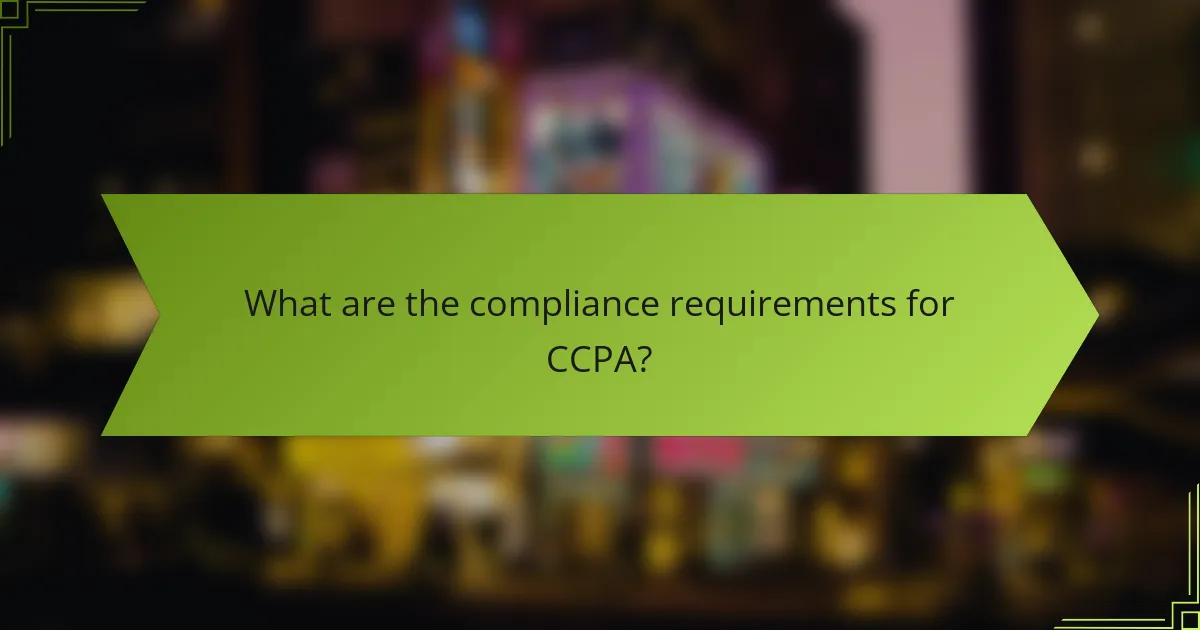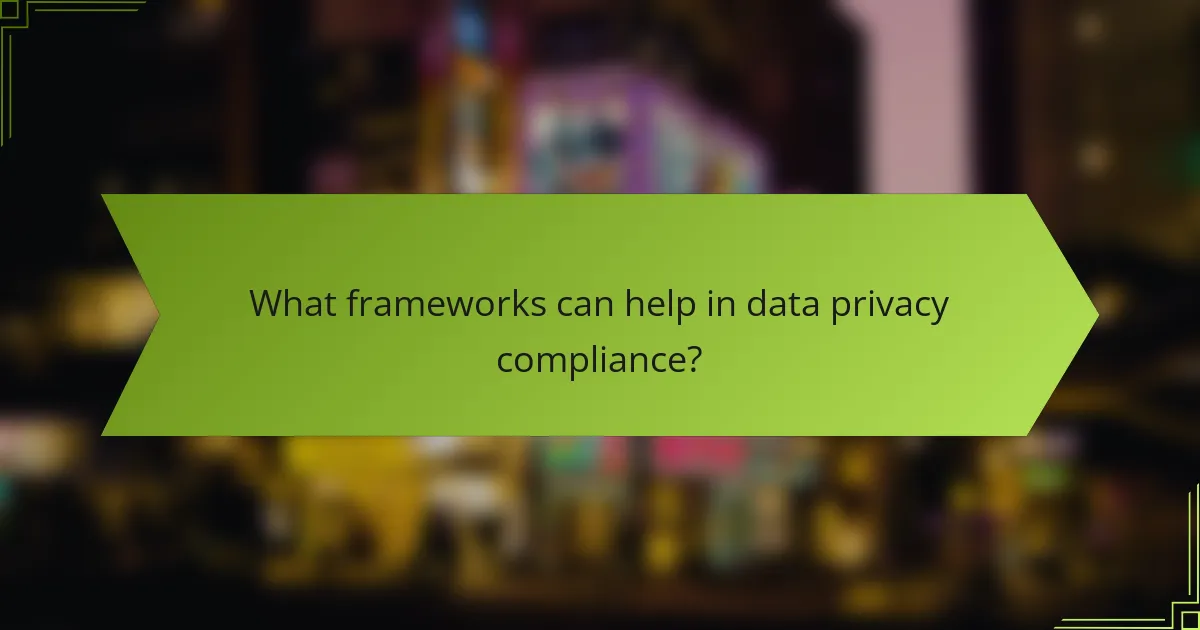Data privacy regulations such as the General Data Protection Regulation (GDPR), the California Consumer Privacy Act (CCPA), and the Health Insurance Portability and Accountability Act (HIPAA) play a crucial role in safeguarding personal information. These laws establish guidelines for data collection, processing, and protection, ensuring that individuals’ privacy rights are upheld. Compliance with these regulations requires organizations to implement specific measures, including transparency, consent, and respect for consumer rights.

What are the key data privacy regulations in the US and Europe?
The key data privacy regulations in the US and Europe include the General Data Protection Regulation (GDPR), the California Consumer Privacy Act (CCPA), and the Health Insurance Portability and Accountability Act (HIPAA). These regulations set standards for how personal data is collected, processed, and protected, ensuring individuals’ privacy rights are respected.
General Data Protection Regulation (GDPR)
The GDPR is a comprehensive data protection law in the European Union that came into effect in 2018. It governs how organizations handle personal data, requiring them to obtain explicit consent from individuals before processing their information.
Key principles of GDPR include data minimization, purpose limitation, and accountability. Organizations must ensure that personal data is collected only for legitimate purposes and that individuals have the right to access, rectify, or erase their data.
Non-compliance can result in significant fines, reaching up to 4% of annual global turnover or €20 million, whichever is higher. Businesses operating in the EU or handling EU citizens’ data must prioritize GDPR compliance.
California Consumer Privacy Act (CCPA)
The CCPA, effective since 2020, enhances privacy rights for California residents, allowing them to know what personal data is collected and how it is used. It grants consumers the right to opt-out of the sale of their personal information and to request deletion of their data.
Businesses must provide clear privacy notices and respond to consumer requests within specific timeframes. Fines for non-compliance can reach up to $7,500 per violation, emphasizing the importance of adherence to the law.
Companies that meet certain revenue thresholds or collect a significant amount of personal data must ensure they have robust processes in place to comply with CCPA requirements.
Health Insurance Portability and Accountability Act (HIPAA)
HIPAA is a US regulation that safeguards medical information, ensuring the privacy and security of patients’ health data. It applies to healthcare providers, insurers, and any entities that handle protected health information (PHI).
Under HIPAA, covered entities must implement administrative, physical, and technical safeguards to protect PHI. Patients have the right to access their health records and request corrections, reinforcing their control over personal health information.
Violations of HIPAA can lead to civil and criminal penalties, making compliance essential for healthcare organizations. Regular training and audits are recommended to maintain adherence to HIPAA standards.

How to ensure compliance with GDPR?
To ensure compliance with GDPR, organizations must implement specific measures that protect personal data and uphold individuals’ rights. This includes understanding data processing activities, obtaining consent, and maintaining transparency with data subjects.
Data Protection Impact Assessments
Data Protection Impact Assessments (DPIAs) are essential for identifying and mitigating risks associated with data processing activities. Organizations should conduct DPIAs when initiating new projects that involve personal data, especially when using new technologies or processing sensitive information.
A DPIA typically involves assessing the necessity and proportionality of processing, evaluating risks to individuals’ rights, and determining measures to mitigate those risks. This proactive approach helps organizations demonstrate accountability and compliance with GDPR requirements.
Appointing a Data Protection Officer
Appointing a Data Protection Officer (DPO) is a key requirement for many organizations under GDPR. The DPO is responsible for overseeing data protection strategies, ensuring compliance, and acting as a point of contact for data subjects and regulatory authorities.
Organizations should consider appointing a DPO if they process large volumes of personal data or handle sensitive data categories. The DPO should possess expert knowledge of data protection laws and practices, and they must be independent, adequately resourced, and report directly to senior management.

What are the compliance requirements for CCPA?
The California Consumer Privacy Act (CCPA) mandates specific compliance requirements for businesses that collect personal data from California residents. These requirements focus on consumer rights, data transparency, and the ability to opt-out of data sales.
Consumer Rights Notifications
Under the CCPA, businesses must inform consumers about their rights regarding personal data. This includes the right to know what personal data is being collected, the right to access that data, and the right to request deletion of their data.
Businesses are required to provide a clear and conspicuous notice at or before the point of data collection. This notification should outline the categories of personal information collected and the purposes for which it will be used.
Data Sale Opt-Out Options
The CCPA gives consumers the right to opt-out of the sale of their personal information. Businesses must provide a “Do Not Sell My Personal Information” link on their websites, making it easy for consumers to exercise this right.
When a consumer opts out, businesses are prohibited from selling their data to third parties. It’s essential for companies to implement a straightforward process for consumers to opt-out and to ensure compliance with this requirement to avoid potential penalties.

How does HIPAA protect patient information?
HIPAA, the Health Insurance Portability and Accountability Act, protects patient information by establishing national standards for the privacy and security of health data. It ensures that healthcare providers and organizations implement safeguards to maintain the confidentiality of patient records.
Privacy Rule Regulations
The Privacy Rule under HIPAA sets forth regulations that govern how healthcare entities handle protected health information (PHI). It restricts the use and disclosure of PHI without patient consent, allowing patients to access their records and request corrections.
Covered entities, such as hospitals and insurance companies, must provide patients with a Notice of Privacy Practices, detailing how their information may be used and their rights regarding that information. Violations can lead to significant penalties, emphasizing the importance of compliance.
Security Rule Requirements
The Security Rule establishes standards for safeguarding electronic protected health information (ePHI). It requires covered entities to implement administrative, physical, and technical safeguards to protect ePHI from unauthorized access and breaches.
Examples of these safeguards include using encryption for data transmission, implementing access controls, and conducting regular risk assessments. Organizations must also train employees on security protocols to minimize the risk of human error leading to data breaches.

What are the penalties for non-compliance?
Penalties for non-compliance with data privacy regulations can be severe, often involving substantial fines and legal repercussions. The specific penalties vary by regulation, with some imposing fines based on a percentage of annual revenue or fixed amounts, while others may lead to enforcement actions or lawsuits.
GDPR Fines and Penalties
The General Data Protection Regulation (GDPR) imposes fines that can reach up to €20 million or 4% of a company’s global annual revenue, whichever is higher. These penalties are tiered, meaning that less severe violations may incur lower fines, while serious breaches can lead to maximum penalties.
Organizations must be aware that GDPR enforcement is not only about financial penalties; it can also involve reputational damage and operational restrictions. Compliance measures, such as regular audits and employee training, can help mitigate the risk of violations.
CCPA Enforcement Actions
The California Consumer Privacy Act (CCPA) allows for fines of up to $7,500 per intentional violation and $2,500 for unintentional violations. Enforcement actions can be initiated by the California Attorney General, and businesses are required to address consumer complaints promptly to avoid penalties.
To prevent CCPA violations, companies should implement clear privacy policies and ensure that consumers can easily exercise their rights under the law. Regular reviews of data handling practices and consumer communication can help maintain compliance and reduce the risk of enforcement actions.

What frameworks can help in data privacy compliance?
Several frameworks can assist organizations in achieving data privacy compliance, including the NIST Cybersecurity Framework and ISO/IEC 27001 Standards. These frameworks provide structured approaches to managing sensitive data and ensuring adherence to regulations like GDPR and CCPA.
NIST Cybersecurity Framework
The NIST Cybersecurity Framework offers a flexible approach to managing cybersecurity risks, which is essential for data privacy compliance. It consists of five core functions: Identify, Protect, Detect, Respond, and Recover, helping organizations assess their current security posture and implement necessary improvements.
Organizations can start by conducting a risk assessment to identify vulnerabilities and prioritize actions based on potential impacts. Regularly updating security measures and employee training can significantly enhance data protection efforts. For example, implementing multi-factor authentication can reduce unauthorized access risks.
ISO/IEC 27001 Standards
ISO/IEC 27001 is an internationally recognized standard for information security management systems (ISMS). It provides a systematic approach to managing sensitive company information, ensuring its confidentiality, integrity, and availability. Compliance with this standard can demonstrate a commitment to data privacy and security to clients and regulators.
To achieve ISO/IEC 27001 certification, organizations must establish an ISMS, conduct regular audits, and continuously improve their security practices. Key steps include defining security policies, conducting risk assessments, and implementing controls tailored to specific threats. Regular training and awareness programs for employees are also crucial to maintaining compliance.

What are the emerging trends in data privacy regulations?
Emerging trends in data privacy regulations focus on increasing consumer rights, transparency, and accountability for organizations. As technology evolves, regulations like GDPR and CCPA are adapting to address new challenges in data protection and privacy.
Increased Consumer Rights
Recent regulations are emphasizing the expansion of consumer rights regarding personal data. This includes the right to access, correct, and delete personal information held by companies. For instance, under the CCPA, California residents can request businesses to disclose what personal data is collected and how it is used.
Organizations must implement processes to facilitate these rights, which may involve updating privacy policies and training staff on compliance. Failure to comply can result in significant fines, making it essential for businesses to prioritize consumer rights in their data management strategies.
Greater Transparency Requirements
Transparency is becoming a cornerstone of data privacy regulations. Companies are now required to provide clear and concise information about their data collection practices. This includes detailing what data is collected, the purpose of collection, and how long it will be retained.
For example, GDPR mandates that organizations inform users of their data processing activities in a straightforward manner. This trend encourages businesses to adopt privacy notices that are easily understandable, helping to build trust with consumers.
Accountability and Compliance Measures
Accountability is increasingly emphasized in data privacy regulations, requiring organizations to demonstrate compliance through documentation and regular audits. This trend is evident in GDPR’s requirement for Data Protection Impact Assessments (DPIAs) for high-risk processing activities.
Companies should establish robust compliance programs that include regular training, risk assessments, and incident response plans. This proactive approach not only helps in meeting regulatory requirements but also mitigates the risk of data breaches and associated penalties.
